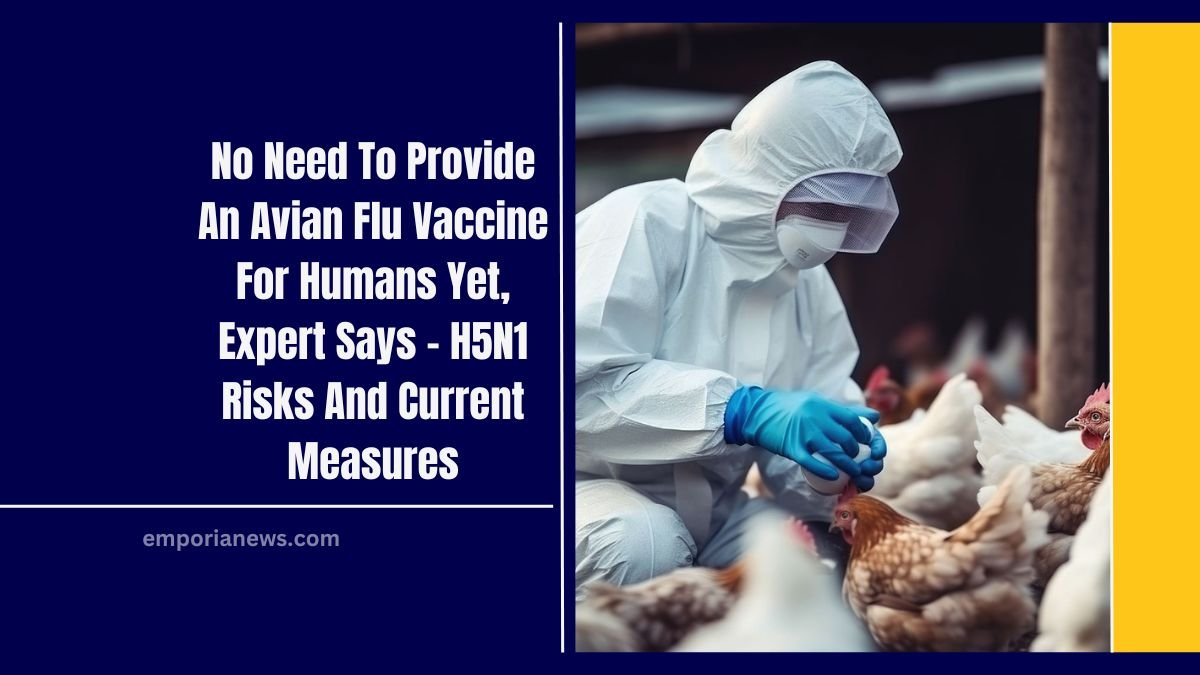As avian influenza (H5N1) continues to raise concerns globally, experts are stressing that there is no immediate need to provide a vaccine for humans, despite some recent cases among dairy workers and poultry farms.
Dr. Shira Doron, an epidemiologist and chief infection control officer at Tufts Medicine in Boston, has emphasized that the situation remains under control, with the relatively mild cases of avian flu not warranting widespread human vaccination at this time.
This article delves into the current situation surrounding H5N1, the spread of avian flu among humans, and the expert opinions on whether human vaccines are necessary.
What is H5N1 Avian Influenza?
H5N1 is a highly pathogenic strain of the avian flu virus primarily affecting poultry, though it can occasionally jump to humans. First identified in 1997, H5N1 has circulated globally for decades, affecting both wild and domesticated birds.
The virus is notorious for its potential to mutate and cause serious outbreaks in poultry, which in turn, raises concerns about possible human infections.
Current State of Human Infections with H5N1
While H5N1 has the potential to cause severe illness in humans, cases of human-to-human transmission have been extremely rare. Dr. Doron states that despite some recent cases, there is currently no cause for panic. Below are some key facts about recent cases of avian flu:
| Fact | Details |
|---|---|
| Number of Human Cases | Very few, with 2 severe cases in humans reported so far |
| Recent Cases | 65-year-old in Louisiana (fatal, underlying conditions) and a teenager in Canada (intensive care) |
| Transmission Mode | Human-to-human transmission not reported |
| Treatment for Infected Humans | Antiviral drugs like Tamiflu are effective |
| Impact on Wildlife and Poultry | Over 133 million poultry affected in the U.S. |
These figures highlight that although there have been some severe cases, they remain isolated and the virus has not yet shown the ability to spread widely between humans.
Why Is a Human Vaccine Not Needed Yet?
Dr. Doron outlines several important reasons why the introduction of a vaccine for humans is not necessary at this point in time:
- Low Transmission Among Humans: The primary concern for a pandemic is the ability of a virus to transmit from human to human. Currently, H5N1 has not shown significant human-to-human transmission, which lowers the immediate pandemic risk.
- Mild Cases and Effective Treatments: Most infected individuals have responded well to antiviral treatments like Tamiflu, and the cases that have been severe involved individuals with pre-existing health conditions.
- Logistical Challenges: Deploying a vaccine to farm workers and others at risk presents numerous challenges, including language barriers, compliance issues, and the presence of undocumented individuals. These factors make it difficult to roll out a mass vaccination program at this time.
- Current Strain Characteristics: Analysis of the current H5N1 strain indicates that it is not well-suited for transmission between humans, reducing its likelihood of evolving into a pandemic virus.
Key Expert Opinions on Avian Flu Control
Dr. Doron and Dr. Julio Figueroa, a Louisiana-based infectious disease expert, have stressed that effective prevention measures are more important than mass vaccination for now. According to their statements:
- Dairy Workers: While dairy farm workers in affected areas are at some risk, the spread of H5N1 among them has been minimal. There have been no additional human-to-human infections.
- Wild Birds and Poultry Farms: The major sources of avian flu transmission remain wild birds and large poultry farms. Advisories are in place for hunters and farm workers handling potentially infected birds.
The focus remains on monitoring the virus, implementing biosecurity measures on farms, and advising at-risk individuals on protective behaviors.
When Might a Vaccine Be Necessary?
Although a human vaccine for H5N1 is not deemed necessary at this stage, experts acknowledge that the situation could change. If the virus begins to show signs of sustained human-to-human transmission or if more severe cases occur, a vaccine might become a priority. However, for now, containment through strict poultry farm measures and antiviral treatment remains the preferred strategy.
In conclusion, experts agree that while the presence of H5N1 avian flu in both wild and domesticated birds remains a serious concern, there is no immediate need for a human vaccine.
The current strain has shown limited potential for human-to-human transmission, and infected individuals respond well to antiviral treatments.
Efforts to contain the virus are focused on poultry farms, dairy workers, and other high-risk groups, but for now, widespread vaccination of the public is not warranted.




